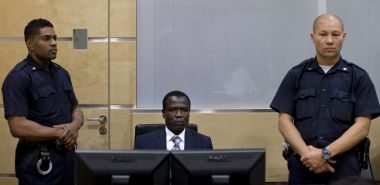I'll defend LRA killer, says Anglican bishop

A retired Anglican bishop in Northern Uganda has said that he is prepared to go to the International Criminal Court (ICC) in The Hague to defend a notorious war criminal.
Dominic Ongwen, a senior commander in the Lord's Resistance Army (LRA) which has terrorised large parts of central Africa and been responsible for tens of thousands of deaths, surrendered to US special forces in the Central African Republic. He appeared at the ICC on Monday.
Ongwen, kidnapped by the LRA at the age of 10, has been accused of crimes including rape, murder and enslavement. However, Bishop Nelson Onono-Onweng, who has been active in seeking a peaceful end to the conflict with the LRA and undertook a dangerous meeting with its leader Joseph Kony and with Ongwen in the Congo in 2006, has said that Ongwen himself was a victim.
"I am willing to go and give evidence at the ICC about him. I am not afraid," he told RNS.
"The world betrayed this child. The state, which had the instruments to protect him, did not. The international community also took too long to act [against the] LRA. The world can see how things conspired against him."
The question of what to do with LRA rebels who have surrendered or been captured is a deeply sensitive one in Northern Uganda's Acholi community, from which the group first arose and from which many of its child victims were abducted. The fact that they were taken at such a young age – some as young as five or six – led to a reluctance to pursue a military solution, even though they had been indoctrinated and coerced into becoming ruthless killers.
The Acholi Leaders Peace Initiative, set up to help negotiate an end to the conflict and mitigate the military response of the Ugandan government, issued its annual end of year peace message in December. It spoke of the need to promote a culture of forgiveness and reconciliation, noting that army action against the LRA in 2008 had only driven it out of Uganda, causing "untold suffering" in the Central African Republic, South Sudan and the Democratic Republic of Congo.
It said that the spirit of unforgiveness had caused "the stigmatisation of those affected with HIV/AIDS, those born in the LRA's captivity and the girl-child-mothers who came back with children born in LRA captivity. Domestic violence still persists against women; inter-state hatred still exists as a result of the LRA war ... Land disputes and other community conflicts have become part of the definition of the contemporary life in Acholi Sub Region."
However, others argue that Ongwen and others should be judged in a court of law rather than being given an amnesty, and that their crimes are too heinous to be overlooked.
The LRA has only an estimated 200 fighters left, in an inaccessible area of the Central African Republic.











